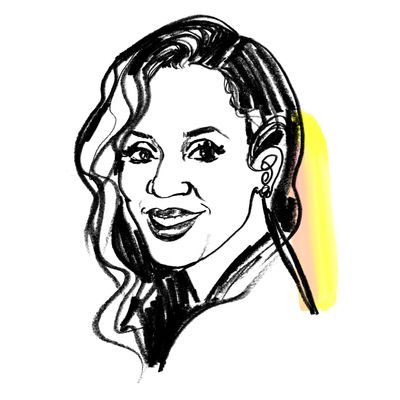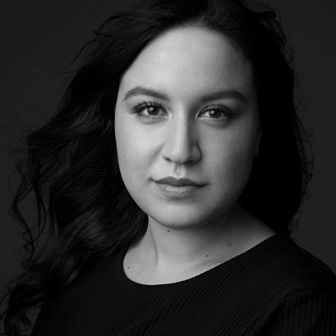
Dascha Polanco was managing a hospital operating room, on track to becoming a nurse, when her mom died. “I was disenchanted,” she says. “I started feeling like, ‘Damn, this is what I’m going to do for the rest of my life, when I know and I feel in my heart that I’m an artist?’” So with the help of her partner, the actress sought acting classes that eventually helped her land the role of inmate Dayanara “Daya” Diaz on Netflix’s Orange Is the New Black. Since then, the Dominican actress has appeared onscreen in Russian Doll, The Assassination of Gianni Versace, and When They See Us. Next, she’ll star as Cuca in In the Heights, Jon M. Chu’s adaptation of Lin-Manuel Miranda and Quiara Alegría Hudes’s Tony Award–winning musical. Ahead of the release, and from the comfort of her home in Riverdale, New York, she spoke to the Cut about how she gets it done.
On a typical morning:
I’m definitely not structured, and I’m not habitual. So it all depends on the night before, what time I’m waking up, or if I have things to do. Obviously, when I’m home and I’m not shooting or have late nights in the studio, I’m free to wake up whenever I want. But the first thing that I do is [make] my bed. I was taught at a very young age that you don’t leave your house without making your bed — I think it’s a cultural thing. Sometimes when I have the time, I catch myself on social media, but first it’s an hour, then it’s 12 o’clock, and I’m like, What the hell, I have to get up. You get that rude awakening. I was doing intermittent fasting for a while, and I wasn’t eating breakfast. In 2020, I was doing eggs, bacon, spinach, and avocado for breakfast. Sometimes I want cereal. Sometimes I want pizza. I don’t have a set thing in the morning.
On health and wellness:
I watch a lot of documentaries, and I like to try things out. But my eating is so all over the place. I love starches. Once I started reading up on keto and learning about macros and all that, I was like, “You’re telling me that basically I’m eating 50 grams of carbs a day that turns into sugar and that are empty calories that I am not going to benefit in any way from? That’s going to be a problem.” So I became very conscious of what I eat, but I don’t limit myself. When I was on keto really strict — at the beginning of June 2020 — I felt so alert. I started realizing I was getting more done. I was not as groggy and tired. But I’m not doing keto anymore.
Right now, my eating’s not about dieting. It’s about being aware, and asking myself, “What am I benefiting from putting this in my mouth?” If I’m going to choose to eat pizza one day, okay, I have a slice one day, but I can’t have pizza every day. You have to make it work for yourself.
I do enjoy working out. I like weight lifting. I like high-intensity interval training. I enjoy walking. I like to dance. Sometimes I’m like, “You know what? Fuck it. I’m gonna do my cardio. I’m gonna go up and down my staircase.” I live on the 30th floor. I go up and down three times, and I’m out of breath.
On the significance of In the Heights:
I saw Crazy Rich Asians on a flight, and you know how they say that when you’re on a flight, there’s something in the air that makes you cry? Through Crazy Rich Asians, I cried the whole time. I was so emotionally fulfilled. I’d never seen a movie like this, with an all-Asian cast. It’s a beautiful movie — the colors and the choreography — and the story is so relatable. I was like, “This is amazing.” And with In the Heights, this isn’t just a special moment for the Latinx community but for everyone, because we will see that in the movie we have the diaspora. And that’s what our communities resemble. We have Asians, Europeans, Africans — everyone. And to see that onscreen, it’s so validating. The trailer made me cry.
You see that there’s a sense of hope within these communities. There’s a sense of family. There’s a sense of joy, of progression. You have the immigrant story. You have the story of the person that’s a small-business owner. You have the matriarch that everyone goes to. You have that one person that wants to go downtown. And In the Heights has the one thing that we all relate to, and that’s a dream, and there’s no small dream that can’t be obtained with the support of a community.
On motherhood:
I made a Mother’s Day post where I said that I don’t identify as a mother. People were like, “This is the stupidest shit I’ve ever heard. How can you not identify as a mother?” But all of my life it’s been something that I was embarrassed about because I started so young. If you ask me, I will tell you I’m a mother, but I would never go, “Hey, I’m Dascha. I’m a mother.” No, I didn’t see it as something that’s an accomplishment. So, for me, motherhood has been raising my kids to understand that I am a person and I have my own dreams and goals. I’m very honest with them, and I’m also very vulnerable with them. I ask them, “Do you think that I don’t love you because I’m working three days in a row?” “Do you think that because I was dating this guy for the last two years, and it didn’t work out, does it make you look at me differently as your mother that I’m going to choose to date somebody else?” “Do you guys want to hang out? What is necessary for you to feel that I’m present in your life?”
Culturally, as an immigrant, we are taught to give back to our parents. I tell my kids, “I don’t need you guys to support me in any way. I don’t expect you guys to give me money or help me with the rent. I’m doing what I got to do so I can set you guys up when I’m not here.” I’m thinking forward, and I think it’s something culturally we’re not taught. I realized that when I was in college, and friends were like, “Why are you giving money to your parents?” And there’s nothing wrong with that. But I look back, and I’m like, “Wow, I took on the responsibility of my mom and my dad and their choices throughout all my 20s.” My kids, I tell them every day, “I am independent.”
On seeking therapy:
When my mom had just died, I didn’t go to therapy, but after I had my son, I realized I was crying every day. But when I went to speak to a therapist, I didn’t feel comfortable because culturally we didn’t speak the same language. So I couldn’t really tell them shit the way I wanted. That’s why we speak to our friends, to family, to people that are not necessarily professionals, and that, for me, is a huge concern in our community. There’s definitely a cultural barrier. That therapist was probably super-professional and quite capable, but he wasn’t going to understand. So I stopped going. And recently, I realized that I’ve been living with depression and anxiety for a long time. I had things that I had to address, whether it was looking in the mirror and saying, “Oh, I have body dysmorphia,” or, “This is depression.” In our culture, we’re taught to feel like you are strong. Like, my mom. My mom was always “strong.” She really wasn’t. It’s like, “You guys needed somebody. You needed therapy.” And I reached a point where I said, “I cannot live anymore and not enjoy what I’m doing. Then what am I doing this for?”
Now I meet with my therapist once or twice a month, and she guides me to come up with my own analysis and conclusions and helps me stop self-sabotaging.
On hashtagging her Instagram photos #ISmellGood:
I love fragrances. That’s one thing that I splurge on that I don’t regret ever. I love the scientific component of fragrances and what it takes to make them and their history. And I love what fragrances do for my confidence when I walk into a room and I leave behind my scent, and people are like, “Oh my God. It’s amazing.” It’s like my shield, and that’s why I say, “Y’all can criticize me all y’all want on everything, but I smell good. You can’t take this shit away from me.”





